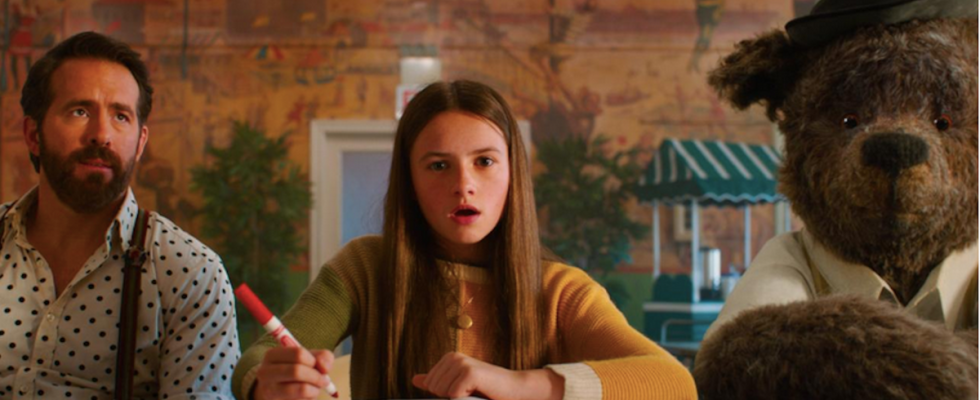Published on
Updated
Reading 3 min.
in collaboration with
Johanna Rozenblum (clinical psychologist)
In theaters from May 8, the new film Blue & Company gives pride of place to children’s imaginary friends, once useful, then abandoned. And in real life, should we worry about this totally invented invisible friend when we’re a parent? We asked Johanna Rozenblum, clinical psychologist, the question.
Has your child, more or less grown up, ever turned to an imaginary friend to play, or during a difficult passage? If this is the case, perhaps he (and you too) will be seduced by the film Blue & company, in theaters from May 8. A feature film mixing reality and animation, which aims to prove that imaginary friends do exist… They have just been forgotten by children who have become adults. A fable which can question us about the role of these curious roommates who sometimes share the daily lives of our children. Should we be worried about it?
An imaginary friend, but very real support
Hearing your child speak to an invisible being in his room or make a space on the sofa can indeed be disturbing for a parent who does not expect it. But rest assured, he does not suffer from any pathology, he is only expressing his emotions, as explained by Johanna Rozenblum, clinical psychologist and member of our Doctissimo expert committee.
“There is nothing rare or strange about an imaginary friend and there is nothing to worry about! In children, they are what we can call the equivalent of a teenager’s diary, for example. A way of creating a mental image with whom we can share things in thoughts, and even verbalize them out loud.
For our expert, this is even proof of cognitive development that is moving in the right direction.
Why did he create an imaginary friend?
The young child (around 3 to 7 years old, even if there is no age limit!) thus encounters multiple reasons to create a character in their everyday life:
- To translate your emotions and verbalize them;
- If he is an only child, to find a playmate;
- To get through a transition situation more easily (a move, a bereavement, etc.);
- To test your limits (it’s the friend who dares to say a bad word or do something stupid).
When should we worry?
Although you should not take a dim view of this friend who invites himself to your home, there is still a case that should attract your attention.
“When it comes to a friend found who allows the child to have fun, to be creative, to verbalize his emotions, everything is fine. On the other hand, if this friend seems to you to become a refuge from reality, a friend who takes the place of all the others, who slows down social motor development and the child isolates himself completely, this may hide a reason, a more annoying discomfort, which requires speaking to a psychologist”, isays our expert.
In this case, it is not the imaginary friend that is the problem but rather what he may be hiding.
Accept the imaginary friend rather than rejecting him
Our expert also reminds us: if this attachment seems incongruous to you, it is not a question of rebuffing the child and telling him that his friend does not exist or of demanding that he stop inventing.
“It’s not a question of encouraging him, but of being interested: ask him to explain to you who this friend is, is he imaginary? Or does he like to believe that Is he at his side? Does he talk to him or is he just a playmate? Things are often less worrying once you have exposed them to your child.
And as the film shows, in most cases, your child will simply abandon their imaginary friend when they no longer need them.
